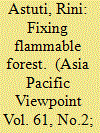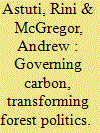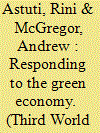|
|
|
Sort Order |
|
|
|
Items / Page
|
|
|
|
|
|
|
| Srl | Item |
| 1 |
ID:
174828


|
|
|
|
|
| Summary/Abstract |
Peatland fires and the impact of transboundary haze are often intertwined with socio‐environmental externalities of neoliberal forest governance and overlapping systems of resource property rights in Indonesia. New peatland governance strategies are emerging to address fires and haze by reorganising peatland management using a more ecologically relevant scale that territorialises peatland according to its hydrological characteristics. Employing the concept of the eco‐scalar fix, this paper interrogates rescaling peatland governance as a strategy to address the socio‐ecological crisis associated with the conversion of peatland into mono‐agricultural land. However, rescaling peatland governance entails the risk of merely displacing socio‐environmental crises to areas considered less ecologically important rather than addressing them. Drawing on a case study of a peatland restoration in Riau, Indonesia, this paper shows how emerging hybrid forms of peatland governance can address the environmental externalities that have unintentionally been created. This hybrid form of peatland governance has pressured actors across multiple types of property to rework the ways that environmental commons are controlled and accessed.
|
|
|
|
|
|
|
|
|
|
|
|
|
|
|
|
| 2 |
ID:
138255


|
|
|
|
|
| Summary/Abstract |
The Reducing Emissions from Deforestation and Forest Degradation Plus (REDD+) programme seeks to reshape the way we value, govern and interact with forests. Rather than managing forests according to interests in timber, conservation, land or livelihoods, REDD+ encourages forms of forest management that prioritise carbon. While international negotiations are shaping the rules of the programme, how it takes place on the ground will depend on its interpretation and implementation in different places. In this paper, we are interested in how the REDD+ Task Force (Satgas REDD+), an ad hoc body formed by presidential decree to design and implement REDD+ readiness activities in Indonesia, has attempted to mainstream the programme from 2010 to 2013. We develop a governmentality approach to focus on how the Task Force sought to introduce REDD+ carbon rationalities to forest politics. Based on extended ethnographic research, we identify three strategies: adopting and promoting the carbon discourses circulating among global REDD+ communities; making carbon visible and governable through mapping technologies; and implementing participatory technologies to encourage pro-REDD+ subjectivities. In some ways, the Task Force has been successful in building awareness about forest carbon among forest stakeholders in Indonesia. National civil society organisations, in particular, appear to be supportive of REDD+; however, they emphasise ‘co-benefits’ framed as ‘Beyond Carbon’, informed by social and environmental justice. For others, however, forests remain sources of timber and land, and new strategies are required if REDD+ is to have substantial impacts on forest governance in Indonesia. The Task Force's efforts reveal the difficult and contested processes through which global climate change programmes come to be embedded in national arenas.
|
|
|
|
|
|
|
|
|
|
|
|
|
|
|
|
| 3 |
ID:
142659


|
|
|
|
|
| Summary/Abstract |
This paper analyses the technologies of government that proponents of the Reducing Emissions from Deforestation and forest Degradation (REDD+) mechanism are adopting to influence forest governance in Indonesia. It analyses the aspects of forest governance being problematised; the solutions being constructed; and who is influencing the production and content of these solutions. The research focuses on three aspects of the One Map Initiative: the forest moratorium; forest licensing; and new standards in participative mapping. Our findings show that the initiative has created new opportunities and constraints for forest reform. New disciplinary and participatory technologies have emerged that have created political spaces for activists to actively promote social and environmental justice concerns. However, our analysis also shows tensions for forest stakeholders between engaging in the new opportunities of the green economy and the risk of having political issues rendered technical.
|
|
|
|
|
|
|
|
|
|
|
|
|
|
|
|
|
|
|
|
|